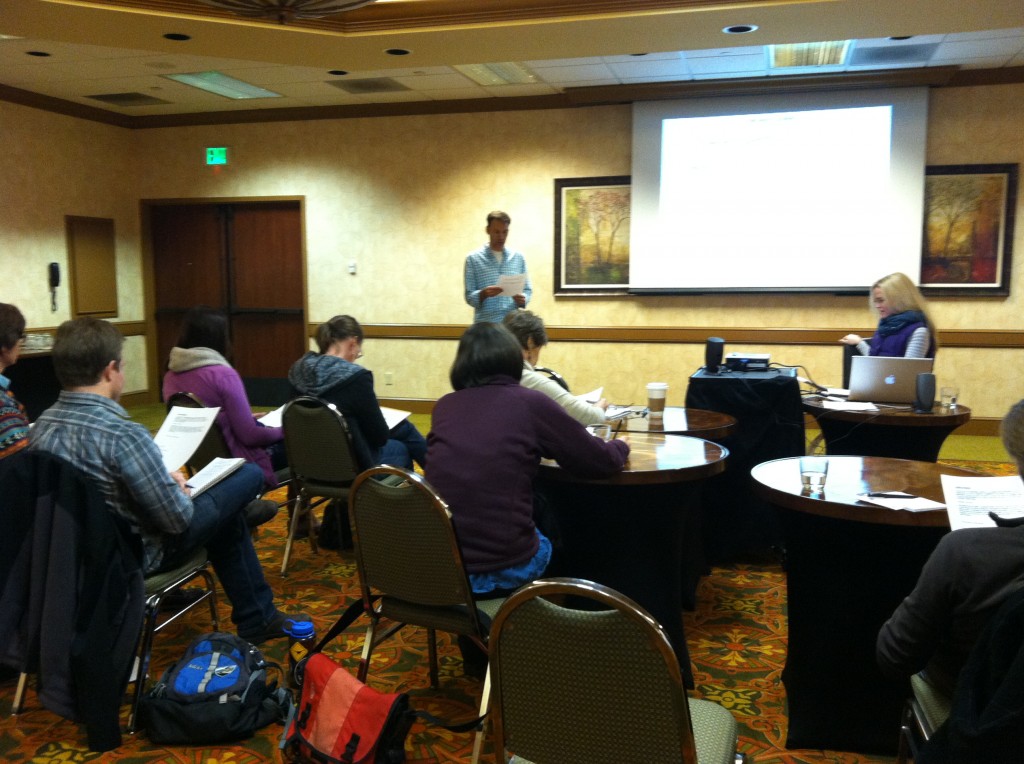#251) THE ‘S’ TEAM WORKSHOP: “Critical Storytelling” in Action
December 11th, 2012
Last week’s version of our S Team Workshop with the National Park Service produced another “wow” moment at the end. Storytelling needs a critical perpsective . That’s what we’re teaching.
DO YOU REALLY KNOW WHAT A STORY IS? This question is at the core of the S Team Workshop. It starts with gaining a clear, critical understanding of what is, and is not, “a story.” Here’s Brian reading the logline of “Star Wars” as Dorie leads the narrative structure part of the workshop last week with National Park Service.
space
WHAT IS (AND IS NOT) A STORY?
Last week we staged the third incarnation of the “S Team Storytelling Workshop” which I first assembled a little over a year ago. The team consists of myself as the bridge between Hollywood and the science/environmental world, Hollywood script analyst Dorie Barton as the “cerebral” element (narrative structure), and Groundling/improv instructor Brian Palermo as the “visceral” element (improv acting exercises). The detailed description of the workshop I’ve provided here.
The first iteration was last year in Los Angeles with 22 environmental activists. It was good, but we were just getting started. In August of this year, we ran the workshop with 22 staff of the Natural Resource Defense Council (NRDC) in San Francisco. That one ended with an eye-opening finale as the participants took in our notes on their stories, did a final rewrite, then ended the day with tight, punchy, powerful stories ready to put to work in presentations. We were as impressed as they were with the ground they covered in just one day.
The third, and best yet, version took place last week in Fort Collins, Colorado with two groups of 12 each from the National Park Service. This time we split the workshop into two days which added an extra element of allowing the first day’s material to sink in overnight. This one also ended with the participants having molded their stories from very crude first drafts to tight, efficient one minute presentations by the end. But there was something extra.
space
CREATING CRITICAL MONSTERS?
On the day after the workshops I met with a smaller group of their climate folks. At the start of our session I showed them a short climate video that several of them had seen before. One person said, “Oh, yeah, this film is great!” Just before I played it. But when it was over she changed her mind. “Actually, that wasn’t as good as I remember.” Then the others began chiming in with, “there was no story — just a bunch of expositional statements,” and, “it kind of lacked specifics,” and, “there was no clear theme,” and a bunch of other critical comments that came right out of the previous two days of critical thinking towards storytelling.
In some ways it sounds like kind of a bummer — that we taught everyone how to not enjoy films. But this is serious stuff. Narrative structure is incredibly important and little practiced. As I pointed out a couple weeks ago, the ENTIRE Presidential election outcome may have been determined by a few folks who had a good grasp of narrative dynamics. You can no longer afford to be naive on this stuff.
So I know this sounds like a big advertisement, which maybe it is. The fact is Dorie, Brian and I are all overbooked for next year and not looking for this sort of work (and have at least two more bookings for this workshop coming together). But the workshop is a huge amount of fun for all of us. We actually LIKE working as a team and meeting new folks, and when it’s helping good folks like the NRDC and the National Park Service it makes us feel like there’s an extra value.
The workshop is a dynamic entity that is still evolving as we go along. Each time the three of us work together we’re continuing to build on what we’ve learned so far. It’s a Hollywood-oriented approach to studying the way analytical people tell stories. It’s fascinating. You should get in touch if you think you might want to book the workshop for your group. You can write to us here: info@randyolsonproductions.com
Our next group outing will be at the Aquatic Science Meeting in New Orleans, Feb. 17-19, where the three of us will be doing both our S Factor Panel (presenting 10 short videos made by scientists) and a shortened version of our workshop. Hope to see you there!
